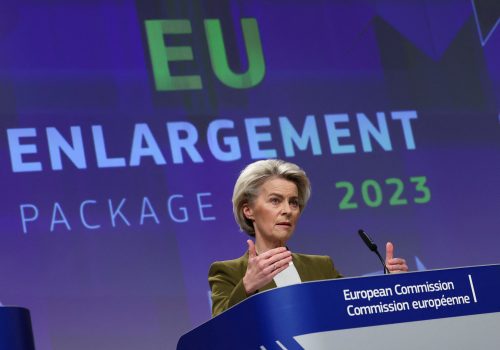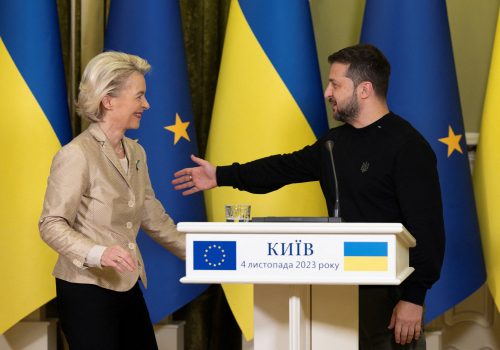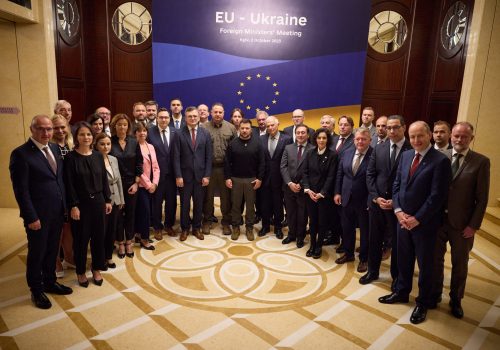What’s next for Ukraine’s bid to join the European Union
On November 8, the European Commission, the executive arm of the European Union (EU), adopted the 2023 Enlargement Package, which recommended opening accession negotiations for Ukraine and Moldova to join the bloc. However, the final decision to formally open negotiations still depends on the yet-uncertain unanimous approval of the leaders of the twenty-seven EU member states.
With the first opportunity for approval coming up as soon as next month, a united and undivided “yes” from EU leaders would be a boost to Ukraine going into what is shaping up to be a pivotal 2024.
What are the results of the report?
The EU decided to grant candidate status to Ukraine in June 2022, shortly after the beginning of Russia’s full-scale invasion of Ukraine. This decision galvanized the Ukrainian government to meet the initial steps outlined in the membership application adjacent to approving candidate status.
The Commission report published as part of the overall Enlargement Package outlined Kyiv’s considerable efforts to address the initial application criteria. Ukraine has, for example, cracked down on several high-profile officials accused of bribery and embezzlement and expanded specialized anti-corruption agencies. It has also moved forward on judicial selection and governance reform, and it has made progress in aligning Ukrainian law to the full body of EU law, or the acquis.
Regarding the progress Ukraine has made, European Commission President Ursula von der Leyen said that “Ukraine has completed well over 90 percent of the necessary steps that [the Commission] set out last year.”
While formally recommending that Ukraine advance to accession negotiations, the report also outlined several areas that require improvement. Though Ukraine has made great strides on decentralization, public administration reform, and laws ensuring freedom of expression and fundamental human rights, there is still a long way to go in reforming the courts, tackling systematic corruption, and preparing to integrate into the EU common market.
What’s next?
Though the report outlined areas that need continued improvement, the Commission recommended that the European Council, the second executive arm consisting of the heads of state of the twenty-seven EU member states, formally open accession negotiations.
The first opportunity for the Council to back the Commission’s plan toward Ukraine’s accession will be at an upcoming summit of EU leaders in Brussels on December 14 and 15. Following unanimous approval from the European Council, the EU will formally open negotiations.
Even as the Commission signaled that it is ready to begin preparatory work on Ukraine’s accession following the Council’s approval in December, it is worth noting that the actual start of the negotiations is dependent on Kyiv’s progress on key measures outlined in the report. These include steps toward limiting oligarch influence and establishing the legal framework and implementation of laws protecting the rights of national minorities, media, and education. The Commission would then report on the progress of these measures in March 2024 and finalize the negotiating framework pending satisfactory development.
Though some consider a smooth approval to open these negotiations in December nearly inevitable, concerns remain over continued resistance from Hungary to greenlighting accession negotiations amid a deepening divide between Budapest and Brussels. There is also concern about the extent to which EU and international attention has shifted from Ukraine to the Israel-Hamas conflict.
What are the stakes?
Failure to open negotiations as expected in December risks putting Ukraine in uncertain territory heading into 2024 and into the third year of Russia’s full-scale invasion.
The symbolism of 2024 is also important—it will mark a decade since the beginning of Russia’s invasion of eastern Ukraine and the February 2014 Revolution of Dignity that saw the ousting of pro-Russia former President Viktor Yanukovych. Hundreds of thousands of Ukrainians marched throughout Ukraine from November 2013 to February 2014 in the Euromaidan protests against Yanukovych’s turn toward Russia and sudden withdrawal from closer integration with the EU.
Many Ukrainians—hoping for a prosperous, free, and independent country—marched draped not only in the blue and yellow of the Ukrainian flag, but also in the flag of the EU.
More than 90 percent of Ukrainians support their country’s membership in the EU by 2030, according to a poll earlier this year by the National Democratic Institute.
Ukraine’s continued commitment toward reform—even as significant portions of the country remain under continuous attack or occupation by Russian forces—has more than proved Ukraine’s dedication and will in aligning itself with the EU and the West.
A decision this December would not only represent an important vindication of Kyiv’s decade-long effort to join the EU, but also cement the EU’s continued commitment to Ukraine’s rightful place in Europe.
Aleksander Cwalina is a program assistant for the Atlantic Council’s Eurasia Center.
Further reading
Thu, Nov 9, 2023
Will the EU get new members soon? Here’s what you need to know.
New Atlanticist By
Ukraine, Moldova, and Georgia just saw their bids to join the twenty-seven member bloc boosted by the European Commission. Atlantic Council experts explain what it means for EU enlargement.
Thu, Nov 9, 2023
Historic progress: Ukraine receives green light for EU membership talks
UkraineAlert By Peter Dickinson
The European Commission this week recommended opening EU membership negotiations with Ukraine. The move represents historic progress at a time when Ukrainians are fighting to defend their independence and their right to choose a European future, writes Peter Dickinson.
Tue, Oct 24, 2023
Ukraine’s EU membership bid set to receive big boost in November
UkraineAlert By Peter Dickinson
The European Commission is expected to give Ukraine the green light to begin EU accession talks in early November, marking a significant step forward in the country’s European integration ambitions, writes Peter Dickinson.
Image: Handout photo shows Ukrainian President Volodymyr Zelenskyy welcomes European Commission President Ursula von der Leyen to the Mariinsky Palace, November 4, 2023 in Kyiv, Ukraine. Photo by Ukrainian Presidency via ABACAPRESS.COM


